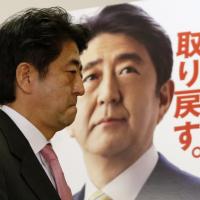
Election sees big defeat for incumbent Democratic Party
Shinzo Abe and the Liberal Democratic Party (LDP) swept the Japanese election on 16 December, gaining 294 seats in the 480 seat lower house. Together with its junior coalition partner, the New Komeito Party, the LDP has a two-thirds majority in the lower house enabling it to override the upper house and make changes to the constitution. In the election campaign, Abe pledged to scrap the ‘pacifist’ Article 9 enabling a military build-up. The ruling class want to use nationalism and especially anti-China rhetoric to blind public opinion to the savage austerity plans they want to push through to revive Japan’s “zombie economy”. The extreme right Japan Restoration Party led by Shintaro Ishihara and Toru Hashimoto gained 54 seats.
Abe himself admits that rather than an LDP victory, the election was lost by the Democratic Party (DPJ), which saw its vote crumble, retaining just 57 seats compared to 230 last time. The DPJ broke most of its election promises, doubling sales tax (a move the LDP also voted for), failing to eject a US air base from Okinawa, and reversing a 2011 pledge to close down Japan’s high-risk nuclear power industry. As Asahi Shimbun point out, election turnout was the lowest since 1945, with just 59.3 percent casting a vote. This compares with over 69 percent in the last election in 2009. The main reason for this is the absence of any genuine left force as an alternative to the capitalist parties.
The newly formed Japan Future Party, an anti-nuclear party with a capitalist economic programme, gained nine seats. The Communist Party and Social Democrats together gained ten seats. The LDP’s win on a nationalist programme marks a “sharp swing to the right” in the words of the Irish Times. The election result is an expression of the serious crisis of capitalism internationally and the impasse of Japanese capitalism in particular. Immediately Abe raised the temperature in the infected conflict over the Senkaku/Diaoyu islands saying he wanted to “stop the challenge” from China. As socialists have explained, all governments in the region exploit this and other territorial conflicts to justify bigger arms bills and each side’s superpower ambitions.
Another impact of the elections internationally could be further falls for the yen and a new twist to the global currency war. Abe wants to increase money supply and inflation in order to break a 15-year trend of deflation (price falls). Big Japanese companies like the motor and electronics giants have long complained the high yen has crippled their export performance. But in a world economy mired in depression with protectionism on the rise everywhere, the Japanese ruling class will seek to further shift the burden of the crisis onto the working class, meaning major class battles are inevitable.


Be the first to comment